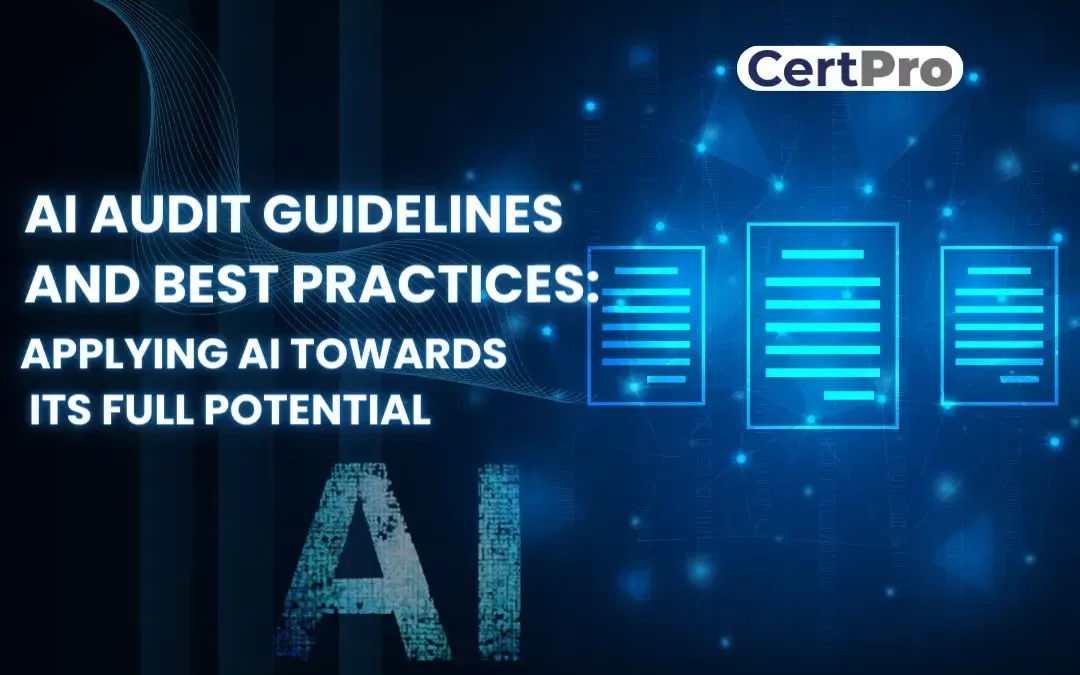Artificial Intelligence is entering different industries, where it is used for customer handling, data management, and documentation processes. The interference of AI is increasing concerns regarding ethical practice and safety. Therefore, AI audits have become more relevant and necessary for industries using and deploying AI-based systems. In modern business, AI is used in healthcare, finance, banking, and law enforcement. Thus, AI systems require concrete audit procedures to review the outcomes, system performance, and data security.
Recently, KPMG conducted a poll regarding the client’s needs for auditing AI. The responses suggested that 50% of the respondents agreed that their organizations used AI-based systems. In addition, 45% of the respondents are ready to audit their AI systems. Again, 70% of the respondents agreed they needed help understanding the artificial intelligence audit approaches and external support. So, read the article to clarify why AI audits matter for businesses and how to perform the audit process. The article will delve into detailed ideas about artificial intelligence audits and the future of new opportunities.
DISCUSSION ABOUT AN AI AUDIT
AI audit refers to a review of the AI system to assess the algorithms, data, design, and models. Therefore, auditing with external and internal auditors helps recognize AI-based systems’ trustworthiness. Furthermore, auditing AI exhibits the responsibilities of AI systems and the justifiability of the models.
Thus, an audit covers the evaluation of models and algorithms. It analyzes the operation process, technical aspects, and the systems’ fairness and privacy. In addition, auditing AI evaluates the value of AI systems, recognizes the potential risks involved, and develops safeguard measures to mitigate the risk. Hence, AI auditing generally refers to a systematic and piloted program for risk assessment and governance.
In this context, an effective AI audit requires the involvement of internal and external auditors. Organizations sometimes need to disclose sensitive information to recognize the AI-driven function. Therefore, data procurement, preprocessing, storage, and lineage documentation are necessary. The audit evaluates data availability, the integrity of data sources, data relevance, security aspects, and unforeseen data issues related to AI.
RELEVANCE OF AI AUDIT IN YOUR ORGANIZATION
AI-driven decision-making is widely used in the healthcare, finance, and banking industries. The purpose of using AI is to minimize human intervention, and algorithms play a central role in this regard. Hence, it is essential to have appropriate algorithm audits. Auditing ensures that the algorithms are secure, ethical, and lawful. In addition, governance and auditing are critical as AI faces societal challenges. The auditors primarily consider these two aspects while conducting the audit.
Compliance: Organizations need to recognize the risk AI systems pose to the rights and freedoms of data and customers. Similarly, we need to understand data privacy and data protection principles.
Technology: The auditor evaluates the risks related to ML applications and records them in a risk control matrix. In the initial phase of AI development, AI was not aligned with the business objectives and failed to address the responsibilities. Therefore, documentation of such AI implementation risks and appropriate measures for each stage brings trustworthiness and accountability to AI use.
A BRIEF OVERVIEW OF THE IMPORTANCE OF AI AUDITS
AI audits are essential for organizations using AI-based systems. It has many aspects that can improve an organization’s performance.
Supporting Legal Compliance: Utilizing AI systems in modern business helps grow the business with new opportunities. However, different countries have legal frameworks and regulations to measure the efficacy of AI-based decision-making processes. Therefore, the audit ensures compliance of AI-driven models with legal requirements and protocols.
Standardize the AI Process: The audit standardized and professionalized mature AI systems. Therefore, the AI audit process requires cooperation among the external and internal auditors to define the AI audit standards. Additionally, auditing provides valuable insight into the governance and standardization processes.
Extend Iterative Development: The machine-learning process is divided into problem definition, data collection, preprocessing, model building, deployment, and monitoring. Also, each step of the ML development process needs to be audited in an AI audit. Thus, an effective auditing process and documentation can help develop responsible AI.
Help in Risk Mitigation: AI audits foster confidence and trust in AI-based systems through documentation and a systematic approach. In addition, the auditing process checks AI systems’ compliance with regulatory requirements. Therefore, the governance process mitigates the risks AI applications pose within organizations. Henceforth, the process also helps evaluate potential risks and plan risk mitigation strategies.

THE PROCESS INVOLVES IN AUDITING AI
Auditing AI focuses on developing responsible, fair, and auditable AI systems that foster users’ trust and confidence. Therefore, auditing AI modernizes the approaches to transforming AI into a trustworthy system. Hence, the following steps need to be followed to conduct an audit process.
Designing Strategy: A successful AI adoption requires a clear understanding of the business objectives and goals. Therefore, the organization must consider whether its AI strategy aligns with the desired business potential and decide the AI expenditure accordingly. In this regard, an AI audit reviews the AI-driven business outcomes and rectifies the AI capabilities to explore opportunities. Thus, successful use of AI enables business growth, provides competitive advantages, and ensures a straight operation process.
Improving Accuracy: AI-based systems help make correct predictions in the decision-making process. They provide information about future forecasts and offer recommendations. Therefore, model accuracy makes AI systems trustworthy for operating in diverse circumstances. Changes in data and algorithms interfere with the AI system’s accuracy. Additionally, biased datasets also interfere with the accuracy of the predictions. Hence, continuous algorithm monitoring and identification of potential vulnerabilities improve AI practice.
Data Privacy Audit: Data safety is the prime concern in modern business. Therefore, data privacy has become the main priority for any AI-based system. therefore, A robust structure of the AI monitoring process ensures that consumer data and data from interactions with AI are safe and secure. Thus, data access procedures and privacy compliance ensure data safety when using AI systems. Therefore, the organization must comply with data privacy requirements. Consequently, this includes implementing privacy standards, protecting consumer rights, and protecting legal data usage and protection. Hence, AI audits deal with the quality and integrity of data consumed, accessed, and maintained.
Improving Security Controls: AI systems are prone to security attacks and cyber threats. Although AI offers tremendous opportunities, it is also vulnerable to security threats. In addition, AI systems use third-party devices that increase the risks. Therefore, AI applications require robust security controls and standards to overcome their weaknesses. Hence, the organization must ensure compliance with external security certification to reduce the risks.
Additionally, implementing model governance policies and security advisories improves the overall outlook. Thus, the organization must track the changes made to the AI system and analyze them to understand the compliance status and enhance the security measures. Furthermore, the company should educate employees about data breaches and security.

CONDUCTING AN AI AUDIT UNDER CERTPRO’S GUIDANCE
An effective AI audit requires expert supervision and guidance. It is a complex audit process that requires multifaceted considerations. A clear idea of the organization’s goal is essential at the initial stage. Consequently, a multidisciplinary team and stakeholders should be engaged in this process to maintain transparency in the documentation process. The audit process requires standardized matrices and ethical considerations.
In this regard, the organization can seek help from experts to conduct a successful third-party audit. CertPro can help you in this respect. We are the leading consulting and auditing firm working globally. Again, our expert team will guide you regarding the AI audit process and how to improve the effectiveness of AI systems in your organizations. Similarly, our auditors help you with a continuous monitoring process to ensure data privacy. Furthermore, the actionable recommendation suggested by CertPro confirms regulatory compliance and responsible AI deployment. Thus, connect with Certpro for more tailored services regarding auditing AI.
FAQ
How can artificial intelligence systems be audited?
A structured assessment is required for AI audit. It ensures it aligns with the organization’s predefined objectives, standards, and legal requirements.
Why is AI governance needed?
AI governance is required when machine learning algorithms are used in decision-making. It eradicates machine learning biases and discriminations.
What are the challenges of AI in auditing?
The challenges associated with AI auditing indicate the design and application of tools that assess the efficacy of AI systems. Sometimes, the system shows bias and discrimination.
What is the AI governance framework?
It is a comprehensive term encompassing the definition, principles, guidelines, and policies designed to show the ethical creation and utilization of AI.
What is an independent audit of AI systems?
IAAIS is an infrastructure of trust in autonomous systems that impacts humans in the areas of privacy, trust, and ethics.

About the Author
Tamali Ghosh
Tamali Ghosh is a seasoned creative content writing professional specializing in SOC 2, GDPR compliance, and ISO 42001. Her in-depth knowledge of cyber security and skillful writing capabilities make complex topics straightforward. Additionally, her writing helps the reader understand the rules and regulations in cyber security and information security practice.
FINDING THE RIGHT AUDITOR: THE ULTIMATE CHECKLIST
Selecting an auditor to implement industry-specific rules and regulations is vital. The choice can influence the company’s growth and financial health. Therefore, choosing the right auditor offers valuable insights and ensures compliance and economic stability. You...
AUDIT LOG: INFORMATION SECURITY BEST PRACTICES FOR BUSINESSES
An audit log is the best information security practice for organizations. This article elaborates on the operational process of audit logs and how companies utilize them for business growth. What is an audit log, and how does it work for organizations? For more...
MASTERING IN SECURITY AUDIT IN 2024: BEST PRACTICES FOR BUSINESSES
A security audit is essential for companies to maintain robust information security controls. Therefore, audits become more relevant as the number of incidents of data breaches increases. A study suggested that, from 2021 to 2022, the average cost of data breaches...




